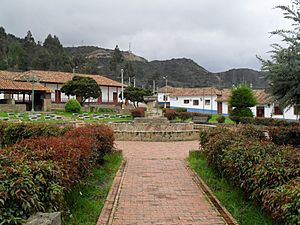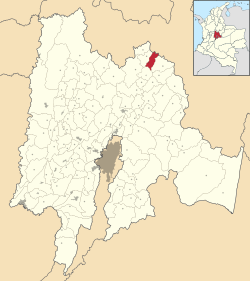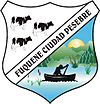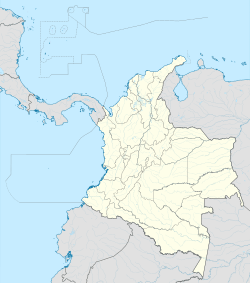Fúquene facts for kids
Quick facts for kids
Fúquene
|
|||
|---|---|---|---|
|
Municipality and town
|
|||

Park in Fúquene
|
|||
|
|||

Location of the municipality and town inside Cundinamarca Department of Colombia
|
|||
| Country | |||
| Department | |||
| Province | Ubaté Province | ||
| Founded | 6 November 1638 | ||
| Founded by | Gabriel Carvajal | ||
| Area | |||
| • Municipality and town | 90 km2 (30 sq mi) | ||
| Elevation | 2,750 m (9,020 ft) | ||
| Population
(2015)
|
|||
| • Municipality and town | 5,617 | ||
| • Density | 62/km2 (162/sq mi) | ||
| • Urban | 263 | ||
| Time zone | UTC-5 (Colombia Standard Time) | ||
| Website | Official website: http://www.fuquene-cundinamarca.gov.co/ | ||
Fúquene is a small town and municipality in Colombia. It's located in the Cundinamarca department, about 116 kilometers (72 miles) northwest of Bogotá, the capital city. Fúquene shares its borders with other towns like Ubaté, Susa, and Guachetá, and also with the Boyacá department.
Contents
Fúquene's Ancient History
Long ago, before the Spanish arrived, the area where Fúquene is now was home to the Muisca. This village was on the edge of different Muisca territories. The northern Muisca were led by the zaque from Hunza. The southern Muisca were led by the zipa from Bacatá.
Lake Fúquene's Sacred Role
A special place for the Muisca was Lake Fúquene. This lake was considered very sacred in their religion. It was an important part of their beliefs and traditions.
Founding of Modern Fúquene
When Spanish explorers came to the area, many Muisca people went to an island in Lake Fúquene for safety. Modern Fúquene was first started in 1542 by Teresa de Verdugo, one of the few women who founded towns back then. The town was officially established on November 6, 1638, by Gabriel Carvajal.
What Fúquene Means
The name Fúquene has two possible meanings from the old Chibcha language. It could come from the words fú and quyny, which together mean "bed of the fox". Another idea is that it was named after a god called Fu. This god was believed to live in the lake and protect the land from the Muzo. So, it could also mean "bed of Fu".
How Fúquene Makes Money
The main ways people in Fúquene earn a living are through livestock farming and agriculture. This means they raise animals and grow crops.
Main Farm Products
Farmers in Fúquene mostly grow potatoes, tomatoes, and maize (corn). They also grow fruits like strawberries. These products are very important to the local economy.
See also
 In Spanish: Fúquene para niños
In Spanish: Fúquene para niños
 | Percy Lavon Julian |
 | Katherine Johnson |
 | George Washington Carver |
 | Annie Easley |




